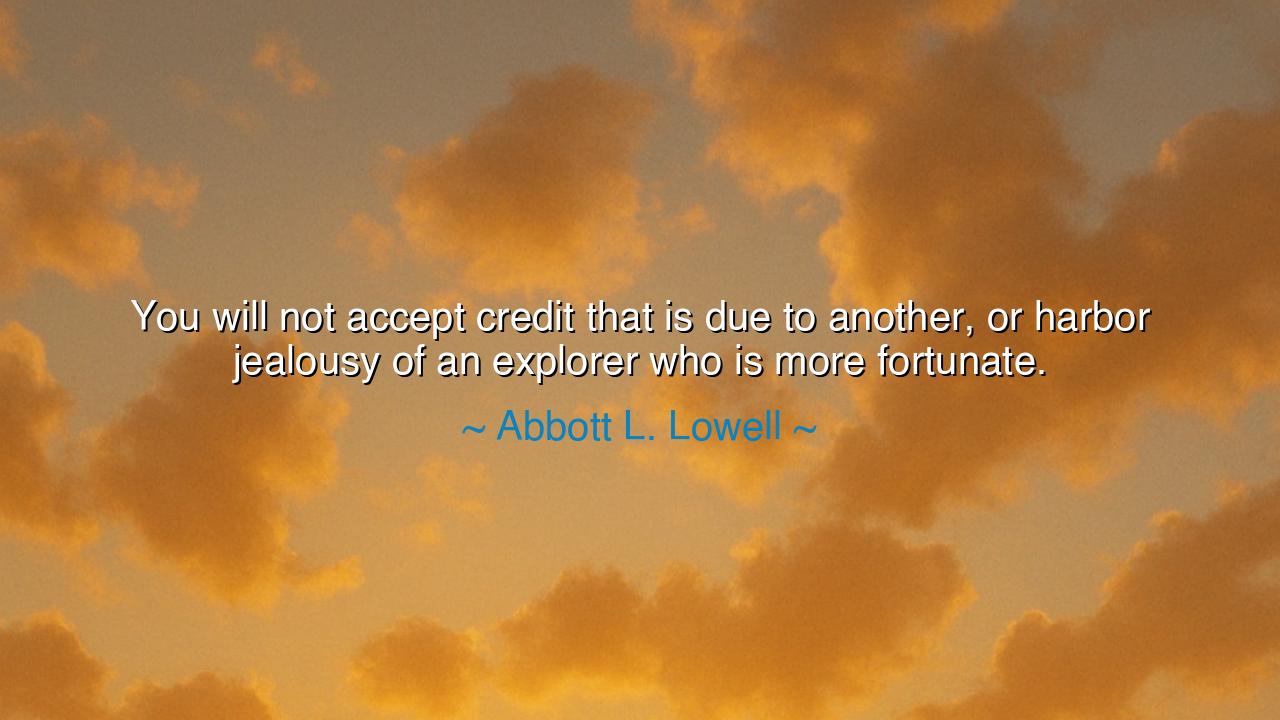
You will not accept credit that is due to another, or harbor
You will not accept credit that is due to another, or harbor jealousy of an explorer who is more fortunate.






There is a noble clarity in the words of Abbott Lawrence Lowell, the esteemed American scholar and president of Harvard University, when he declared: “You will not accept credit that is due to another, or harbor jealousy of an explorer who is more fortunate.” Within these simple lines lies the essence of intellectual integrity and moral honor — the virtues that distinguish the seeker of truth from the seeker of glory. Lowell’s message is a call to purity of purpose: that in the pursuit of knowledge and achievement, one must remain unswayed by vanity or envy. For the true explorer — whether of lands, of ideas, or of the soul — must be governed not by ambition alone, but by humility and justice.
Abbott L. Lowell lived in an era of discovery — an age when human intellect was reaching toward the stars, both literally and figuratively. As the brother of Percival Lowell, the astronomer who famously searched for life on Mars and inspired generations of cosmic dreamers, Abbott was no stranger to the passions and rivalries of those who sought to uncover new frontiers. His words were likely born from observing the delicate balance between ambition and envy — between the desire to achieve and the temptation to covet another’s success. He saw that in the realm of discovery, as in all human endeavor, character must guide intellect, for what use is knowledge gained by the corrupt heart?
To “not accept credit due to another” is an act of integrity that few can easily perform. In every age, there are those who reach greatness by standing upon the work of others — some acknowledging the debt with gratitude, others burying it beneath pride. The temptation to claim what is not ours is as ancient as the fall of man. Yet Lowell warns that to steal recognition is to poison one’s own spirit. Fame gained through deceit is fleeting; honor built upon truth endures. The wise man seeks mastery, not applause. The honest soul rejoices more in the success of truth itself than in the acclaim of being its messenger.
But Lowell’s second command — to “harbor no jealousy of an explorer who is more fortunate” — pierces even deeper into the heart. For jealousy is a subtler thief, one that robs us not of another’s labor, but of our own peace. It is the quiet sickness that grows when we compare our path to another’s, when we mistake fortune for worth, and destiny for fairness. In the great story of discovery, not all who labor will receive equal glory. Some will strike gold with one blow; others will toil in obscurity. Yet the wise understand that every honest effort contributes to the same ascent of humankind. To envy another’s light is to forget that the same fire burns within oneself.
History is filled with both the noble and the envious. Consider Nicolaus Copernicus and Galileo Galilei, who risked all for truth — men whose discoveries reshaped the heavens. Galileo’s brilliance drew envy and wrath from those who could not bear that the universe might favor another mind. Their jealousy clothed itself in piety and tradition, and in their envy, they condemned what they could not surpass. But Copernicus and Galileo were not driven by rivalry; they were driven by wonder. Their purpose was not self-glory, but the illumination of mankind. And thus, though they suffered, their legacy stands — pure, eternal, and free from the stains of jealousy or deceit.
Lowell’s words, then, are not merely rules for scholars — they are laws for the soul. He speaks to every human being who strives, who creates, who competes. To live by these principles is to walk the path of the true explorer, the one who ventures not for acclaim but for truth. Such a person does not measure success by comparison, but by contribution. He honors the work of others as he honors his own, knowing that in the great journey of human progress, all victories are shared victories.
Let this, then, be the lesson passed to future generations: Resist the twin poisons of pride and envy. If recognition comes to you, receive it humbly. If it does not, take pride in the purity of your labor. Rejoice in another’s success as in your own, for their triumph lifts the world a little higher — and in that rising, you too are raised. Seek truth above all, for truth belongs to no one and yet to everyone.
Thus, the teaching of Abbott L. Lowell endures like a lantern in the long corridors of time: that the noblest mind is one untainted by greed, uncorrupted by jealousy, and unwavering in integrity. The world is vast, and its discoveries are many; but the greatest discovery of all is this — that the heart, when freed from envy and deceit, becomes its own universe of light.






AAdministratorAdministrator
Welcome, honored guests. Please leave a comment, we will respond soon